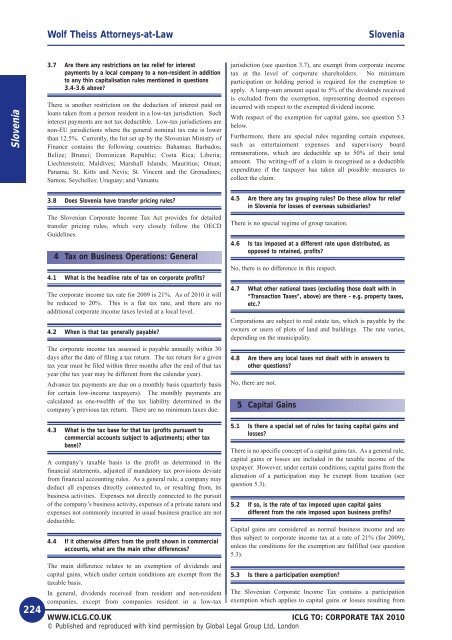Corporate Tax 2010 - BMR Advisors
Corporate Tax 2010 - BMR Advisors
Corporate Tax 2010 - BMR Advisors
Create successful ePaper yourself
Turn your PDF publications into a flip-book with our unique Google optimized e-Paper software.
Wolf Theiss Attorneys-at-Law<br />
Slovenia<br />
Slovenia<br />
3.7 Are there any restrictions on tax relief for interest<br />
payments by a local company to a non-resident in addition<br />
to any thin capitalisation rules mentioned in questions<br />
3.4-3.6 above<br />
There is another restriction on the deduction of interest paid on<br />
loans taken from a person resident in a low-tax jurisdiction. Such<br />
interest payments are not tax deductible. Low-tax jurisdictions are<br />
non-EU jurisdictions where the general nominal tax rate is lower<br />
than 12.5%. Currently, the list set up by the Slovenian Ministry of<br />
Finance contains the following countries: Bahamas; Barbados;<br />
Belize; Brunei; Dominican Republic; Costa Rica; Liberia;<br />
Liechtenstein; Maldives; Marshall Islands; Mauritius; Oman;<br />
Panama; St. Kitts and Nevis; St. Vincent and the Grenadines;<br />
Samoa; Seychelles; Uruguay; and Vanuatu.<br />
jurisdiction (see question 3.7), are exempt from corporate income<br />
tax at the level of corporate shareholders. No minimum<br />
participation or holding period is required for the exemption to<br />
apply. A lump-sum amount equal to 5% of the dividends received<br />
is excluded from the exemption, representing deemed expenses<br />
incurred with respect to the exempted dividend income.<br />
With respect of the exemption for capital gains, see question 5.3<br />
below.<br />
Furthermore, there are special rules regarding certain expenses,<br />
such as entertainment expenses and supervisory board<br />
remunerations, which are deductible up to 50% of their total<br />
amount. The writing-off of a claim is recognised as a deductible<br />
expenditure if the taxpayer has taken all possible measures to<br />
collect the claim.<br />
3.8 Does Slovenia have transfer pricing rules<br />
The Slovenian <strong>Corporate</strong> Income <strong>Tax</strong> Act provides for detailed<br />
transfer pricing rules, which very closely follow the OECD<br />
Guidelines.<br />
4 <strong>Tax</strong> on Business Operations: General<br />
4.1 What is the headline rate of tax on corporate profits<br />
The corporate income tax rate for 2009 is 21%. As of <strong>2010</strong> it will<br />
be reduced to 20%. This is a flat tax rate, and there are no<br />
additional corporate income taxes levied at a local level.<br />
4.2 When is that tax generally payable<br />
The corporate income tax assessed is payable annually within 30<br />
days after the date of filing a tax return. The tax return for a given<br />
tax year must be filed within three months after the end of that tax<br />
year (the tax year may be different from the calendar year).<br />
Advance tax payments are due on a monthly basis (quarterly basis<br />
for certain low-income taxpayers). The monthly payments are<br />
calculated as one-twelfth of the tax liability determined in the<br />
company’s previous tax return. There are no minimum taxes due.<br />
4.5 Are there any tax grouping rules Do these allow for relief<br />
in Slovenia for losses of overseas subsidiaries<br />
There is no special regime of group taxation.<br />
4.6 Is tax imposed at a different rate upon distributed, as<br />
opposed to retained, profits<br />
No, there is no difference in this respect.<br />
4.7 What other national taxes (excluding those dealt with in<br />
“Transaction <strong>Tax</strong>es”, above) are there - e.g. property taxes,<br />
etc.<br />
Corporations are subject to real estate tax, which is payable by the<br />
owners or users of plots of land and buildings. The rate varies,<br />
depending on the municipality.<br />
4.8 Are there any local taxes not dealt with in answers to<br />
other questions<br />
No, there are not.<br />
5 Capital Gains<br />
224<br />
4.3 What is the tax base for that tax (profits pursuant to<br />
commercial accounts subject to adjustments; other tax<br />
base)<br />
A company’s taxable basis is the profit as determined in the<br />
financial statements, adjusted if mandatory tax provisions deviate<br />
from financial accounting rules. As a general rule, a company may<br />
deduct all expenses directly connected to, or resulting from, its<br />
business activities. Expenses not directly connected to the pursuit<br />
of the company’s business activity, expenses of a private nature and<br />
expenses not commonly incurred in usual business practice are not<br />
deductible.<br />
4.4 If it otherwise differs from the profit shown in commercial<br />
accounts, what are the main other differences<br />
The main difference relates to an exemption of dividends and<br />
capital gains, which under certain conditions are exempt from the<br />
taxable basis.<br />
In general, dividends received from resident and non-resident<br />
companies, except from companies resident in a low-tax<br />
5.1 Is there a special set of rules for taxing capital gains and<br />
losses<br />
There is no specific concept of a capital gains tax. As a general rule,<br />
capital gains or losses are included in the taxable income of the<br />
taxpayer. However, under certain conditions, capital gains from the<br />
alienation of a participation may be exempt from taxation (see<br />
question 5.3).<br />
5.2 If so, is the rate of tax imposed upon capital gains<br />
different from the rate imposed upon business profits<br />
Capital gains are considered as normal business income and are<br />
thus subject to corporate income tax at a rate of 21% (for 2009),<br />
unless the conditions for the exemption are fulfilled (see question<br />
5.3).<br />
5.3 Is there a participation exemption<br />
The Slovenian <strong>Corporate</strong> Income <strong>Tax</strong> contains a participation<br />
exemption which applies to capital gains or losses resulting from<br />
WWW.ICLG.CO.UK<br />
ICLG TO: CORPORATE TAX <strong>2010</strong><br />
© Published and reproduced with kind permission by Global Legal Group Ltd, London
















